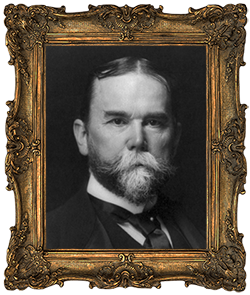The History of Things
By Jeremy Elliott - JHC Executive Director
2024 marks the 200th anniversary of the second oldest house in the City of Salem, widely recognized today as the residence of the honorable Robert and Elizabeth Bennett. This piece of property was originally deeded to Andrew and Margaret Pitts (their daughter, Mary named the town!) from the US government in 1811. The Pitts family then sold this unused and largely untouched property, which included 4 acres, in 1818 to Micah (pictured in the last photo) and Edmund Newby, who had reportedly walked here from North Carolina after the death of their parents. The following year, Micah and his brother, Edmund donated 10 lots to the town of Salem for future growth. Known as the Newby addition, it was the fifth addition to our town, extending Market, Walnut and Mulberry Streets further east. That same year Micah, who was of the Quaker religion, married Mary Coffin, also from Quaker heritage. Micah became a prominent businessman of our community. In the very early days of Salem, he shared a business on the town’s square with the noted Bebe Booth, whom he reportedly met on his migration from North Carolina. They had a clothing store on the Northwest corner, where Linck’s Clothing Store is today. Micah later opened a general merchandise store on the southwest corner of the square. He was our school commissioner, served on our educational board and was a founding member of the Salem Peace Society. Sometime in early 1824, after the construction of the Salem Grammar School, (Washington County Seminary), aka the John Hay birthplace, was completed he supposedly hired the same brick mason to construct a home for him and his wife on lot one of the Newby addition. This is the same house still standing today at 300 East Market Street.
The Newby family left the area around 1846 and moved to Raysville, in Henry County, where Mary Coffin Newby’s parents were residents. The home and property, which extended from Market Street to Walnut Street, was sold to the State Bank of Indiana. Strangely, they held the deed for 10 years before it was sold to Eugene Thomas, a house painter, who migrated here from Pennsylvania. Nine years later, he and his family lost the home in a foreclosure. It was then sold at a sheriff’s sale, by Benjamin Franklin Nicholson to Dr. Samuel Reid, who turned around and sold it to Dr. Benjamin W. Tucker 18 days later. Dr. Tucker, (who lived on the west side of North Main Street, across Mulberry Street from the public library, and is the great grandfather of Marilyn Tucker Quayle), divided the property in January of 1865. He sold the north half to Jonas Berkey and the south half, including the house, to George and Elizabeth Paynter.
George Paynter and his brother operated a hardware store on the town square for 30 years. He was one of the original 8 founding members of the Washington County Historical Society, in 1897. That same year, he and his wife sold the house to their daughter Emma, but they continued to live there until George passed away there in March of 1900. His funeral services were conducted in the home. Shortly afterwards their daughter Emma sold it to her sister and her husband, Leander and Mary Ellen Davis. Leander was a local teacher, served as our county assessor and recorder, and was president of the Hoosier Telephone Company during his lifetime. He also died in the home, on November 3, 1914, and his funeral service was similarly held there. His widow, Mary Ellen Paynter Davis stayed in the home until she sold out to all three of her sisters, Emma Paynter Wood, Lizzie Paynter Hopkins and Cora Paynter Clarke, in 1922. The Paynter sisters held the house until they sold it in 1924, when it was 100 years old, to the newly installed president of the Smith Cabinet Manufacturing Company, Ford Smith.
Ford had the house for 3 years, but I’ve been unable to determine what exactly he did with it and his surviving family members seemed surprised to find out that he owned it. However, in 1927, Ford and Blanche Smith sold it to Dr. Anthony and Nancy Baker. Dr. Baker was a chiropractor and had his office in the home. The couple were also the great Aunt and Uncle of Judge Bennett, but became his surrogate grandparents when they adopted his orphaned mother at 6 weeks of age. When Judge Bennett’s dad left for service in WWII, his mother, Dorothy and he came back to the house she grew up in and stayed with the Bakers for three years. So Judge Bennett has many fond memories of his grandparent’s house. After a stint in the Air Force and attending Indiana University’s school of law, Judge Bennett was offered a job back in Massachusetts, where he was formerly stationed in the military, Here he married a young school teacher named Elizabeth’Betty’ True. Once it was decided that they were going to move back to Salem, they were afforded the opportunity to buy Bob’s grandparents home in 1973. Betty said she just loved the old house and it felt right to be there. They went through a mass of renovations, but always appreciated how well the previous owners had cared for the old house. Bob and Betty raised their family here and now enjoy hosting their grandchildren in the old Newby house. Currently they have lived in the house longer than any other previous owners and Bob says that he has every intention of staying there for the rest of his days. Stay tuned for additional information about this beautiful old home as we get closer to the Old Settlers Days festival!


